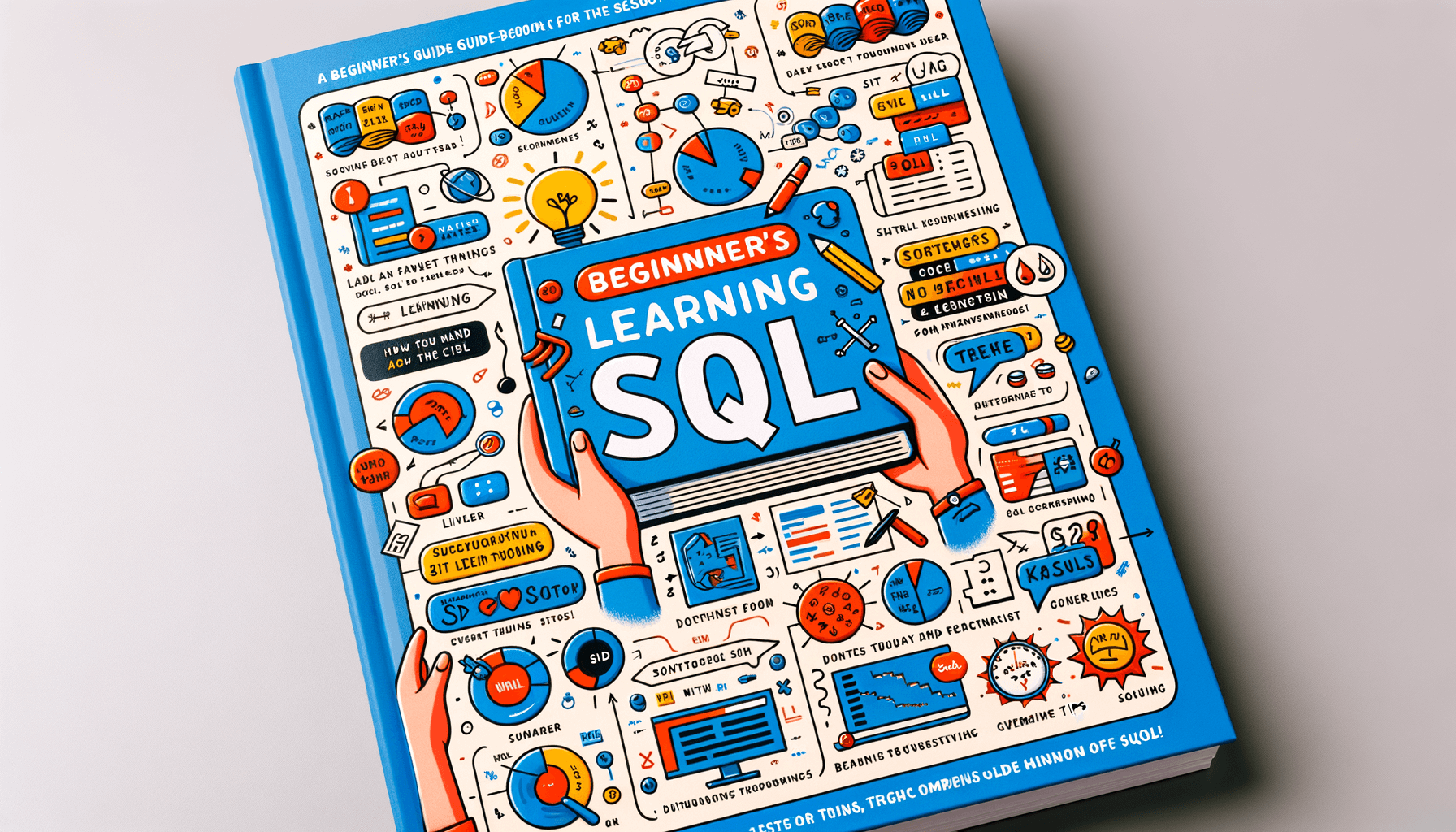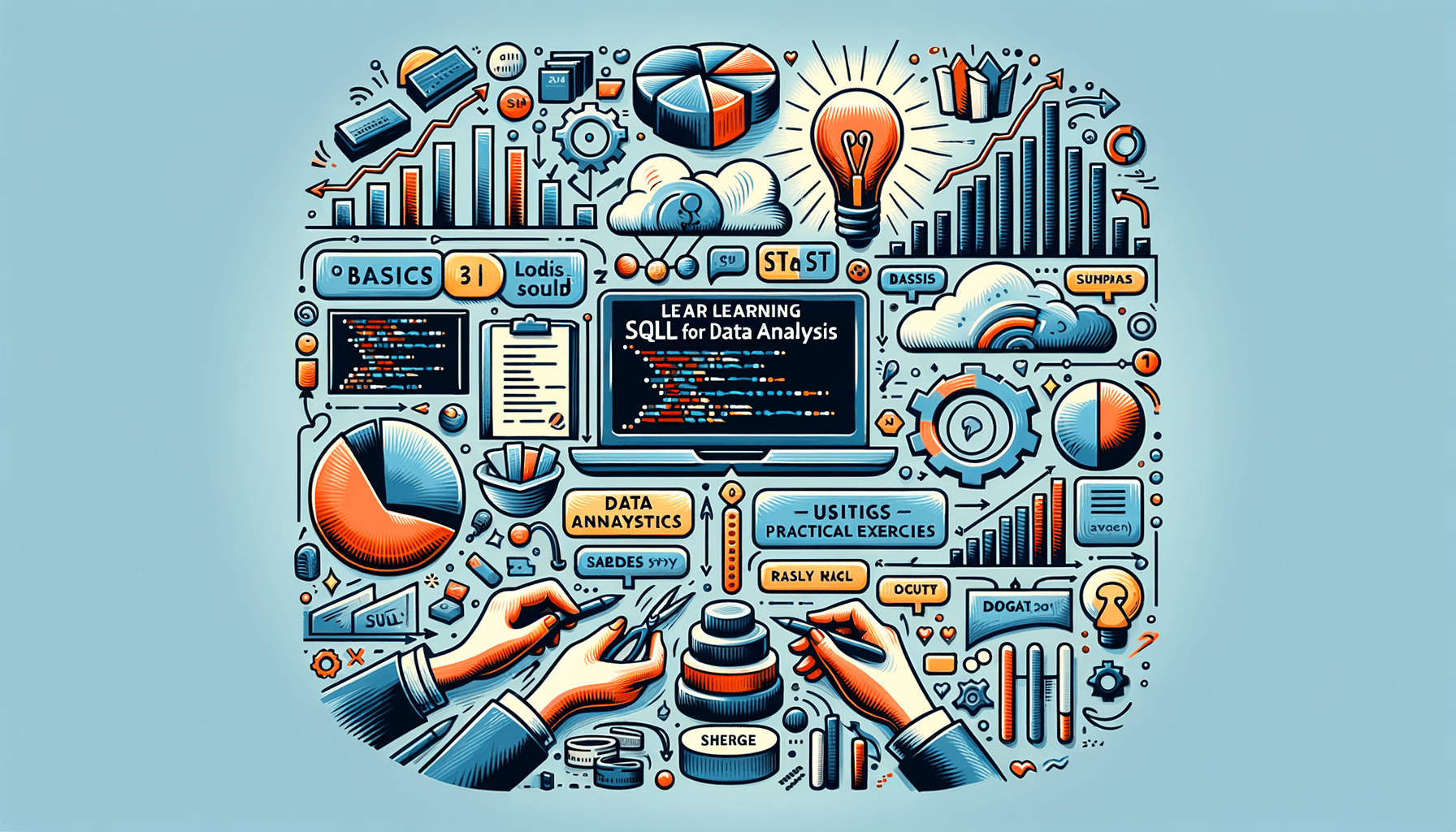A big variety of articles and resources

A Beginner's Guide: How to Learn SQL Effectively
 Sia Author and Instructor
Learn SQL
Sia Author and Instructor
Learn SQL
8 minute read
Understanding the Basics of SQL
What is SQL?
Structured Query Language (SQL) is a programming language used to manage and manipulate relational databases. It is widely used by businesses and organizations to store, retrieve, and manage data. SQL is a standardized language, which means that it can be used with different database management systems (DBMS) such as MySQL, Oracle, and Microsoft SQL Server.
Why Learn SQL?
SQL is designed to be intuitive and straightforward, making it accessible to professionals from all fields. Its syntax is logical and easy to understand, which makes it a great starting point for anyone new to programming or data analysis. Today, SQL is one of the most common programming languages for interacting with data.
Core SQL Syntax
If you're new to SQL, the first step is to understand the basic concepts and syntax. Here are some essential SQL commands to get you started:
- SELECT: This command is used to retrieve data from a database. You can use it to retrieve specific columns or all columns of a table.
- ORDER BY: This command is used to sort data in ascending or descending order based on a specific column.
- FROM: This command specifies the table or tables that you want to retrieve data from.
- GROUP BY: This command is used to group rows that have the same values in specified columns into summary rows.
Each topic is covered clearly and concisely with many practical examples that help you truly understand the concept and apply it to solve the data challenges more effectively.
Choosing the Right Learning Resources
Online Courses and Tutorials
Online courses and tutorials are a great way to master SQL basics for beginners at your own pace. Platforms like Coursera, Udemy, and Codecademy offer structured courses that cover everything from basic to advanced SQL concepts. Interactive online courses provide the flexibility to learn whenever and wherever you want, making them an excellent choice for busy individuals.
Books for SQL Beginners
Books are a timeless resource for learning SQL. They offer in-depth explanations and can be a great reference. Some popular books for SQL beginners include "SQL for Dummies" and "Learning SQL" by Alan Beaulieu. These books are well-structured and provide numerous examples to help you understand SQL concepts thoroughly.
Interactive Learning Platforms
Interactive learning platforms like SQLZoo and LeetCode offer hands-on practice, which is crucial for mastering SQL. These platforms allow you to write and execute SQL queries in real-time, providing immediate feedback. This method of learning is highly effective for reinforcing concepts and improving your problem-solving skills.
When choosing a learning resource, consider your learning style and schedule. The best resource is one that fits seamlessly into your life and keeps you motivated to learn consistently.
Practical Tips for Effective Learning
Consistent Practice
The more you practice, the more comfortable you'll become with SQL. Consistent practice is key to mastering SQL. Try to work with real-world data sets to make your learning more relevant. Break down complex queries into smaller parts to understand how they work. Don't be afraid to make mistakes; they are part of the learning process.
Working on Real Projects
Use real-world examples to make your learning more relevant. Working on real projects helps you apply what you've learned in a practical setting. This approach allows you to see how SQL is used in real-world applications, making your learning experience more meaningful.
Joining SQL Communities
Joining SQL communities can provide you with additional support and resources. You can ask questions, share your knowledge, and learn from others. Being part of a community can also keep you motivated and accountable in your learning journey.
Interactive online courses allow you to learn at your own pace, practice with real-world examples, and get instant feedback. It's a flexible and effective way to master SQL, whether you're a beginner or an experienced professional looking to upskill.
Common Mistakes to Avoid
Ignoring SQL Best Practices
One of the most common mistakes beginners make is ignoring SQL best practices. Following best practices ensures that your code is efficient, readable, and maintainable. For instance, always use meaningful table and column names, and avoid using SELECT \* in your queries.
Not Practicing Regularly
The more you practice, the more comfortable you'll become with SQL. Consistent practice helps reinforce what you've learned and makes it easier to recall information when needed. Don't be afraid to make mistakes; making errors is part of the learning process. Platforms like sqlskillz.com vs udemy.com offer opportunities to practice at your own pace.
Overlooking Database Design
A well-designed database is crucial for efficient querying and data integrity. Beginners often overlook the importance of database design, which can lead to inefficient queries and data anomalies. Always plan your database schema carefully and normalize your tables to avoid redundancy.
Try to work with real-world data sets to make your learning more relevant. This will help you understand the practical applications of SQL and improve your problem-solving skills.
Advanced Topics for Continued Learning
Exploring Complex Queries
As you advance in your SQL journey, you'll encounter more complex queries that require a deeper understanding of SQL's capabilities. Mastering these complex queries will enable you to handle more sophisticated data manipulation and retrieval tasks. For instance, learning about window functions and recursive queries can significantly enhance your ability to analyze data.
Understanding Database Optimization
Database optimization is crucial for ensuring that your SQL queries run efficiently. This involves understanding indexing, query optimization techniques, and database schema design. By focusing on optimization, you can improve the performance of your databases, making them more responsive and capable of handling larger datasets.
Learning SQL for Data Analysis
SQL is a powerful tool for data analysis, allowing you to extract meaningful insights from large datasets. By learning advanced SQL techniques, you can perform more detailed and complex analyses. This includes understanding how to use SQL for statistical analysis, data cleaning, and data transformation tasks.
sqlskillz.com vs. datacamp.com: master sql basics, perfect for beginners, learn at your own pace. no credit card required. login or sign up to start learning.
Leveraging SQL in Real-World Applications
SQL in Data Analytics
SQL is a powerful tool in the field of data analytics. It allows analysts to extract, manipulate, and analyze large datasets efficiently. With the right queries, you can pull out specific information from a database to create detailed reports and visualizations. This capability is crucial for making data-driven decisions in any organization.
SQL in Web Development
In web development, SQL is used to manage the backend databases that store user information, content, and other critical data. Many popular web applications rely on SQL databases to function smoothly. For instance, social networks and e-commerce sites use SQL to handle user data and transactions.
SQL in Business Intelligence
SQL plays a significant role in business intelligence (BI) by enabling the creation of advanced and in-depth reports. These reports are often the basis for strategic decisions. BI tools often integrate with SQL databases to provide real-time insights and analytics. This integration helps businesses stay ahead of the competition and fine-tune their strategies.
SQL is not just a relic of the past; it continues to evolve and adapt to the needs of the modern world. Over the years, this database language has become an industry standard, recognized and used by all major organizations.
Leveraging SQL in real-world applications can significantly enhance your data management and analysis capabilities. Whether you're a beginner or looking to refine your skills, our comprehensive courses are designed to help you succeed. Visit our website to explore our course catalogue and start your journey towards becoming a SQL specialist today!
Conclusion
Learning SQL is an invaluable skill in today's data-driven world. Whether you're aiming to enhance your career prospects or simply want to become more adept at managing and analyzing data, mastering SQL is a step in the right direction. By starting with the basics, taking structured courses, and consistently practicing with real-world projects, you can build a solid foundation in SQL. Remember, the key to success is a structured approach and persistent practice. With the right resources and dedication, you'll find that SQL is not only manageable but also incredibly rewarding.
Frequently Asked Questions
What is SQL and why is it important?
SQL, or Structured Query Language, is a standard programming language used to manage and manipulate databases. It is crucial for data management, allowing users to retrieve, update, and analyze data efficiently.
How long does it take to learn SQL?
The time required to learn SQL varies based on your prior experience and the amount of time you dedicate to learning. Generally, with consistent practice, beginners can become proficient in SQL basics within a few weeks.
What are the best resources for learning SQL?
There are various resources available for learning SQL, including online courses (e.g., Codecademy, Coursera), books (e.g., 'Sams Teach Yourself SQL in 10 Minutes' by Ben Forta), and interactive platforms (e.g., W3Schools, SQLZoo).
Can I learn SQL without any prior programming experience?
Yes, SQL is considered beginner-friendly and can be learned without any prior programming experience. Many resources are designed to cater to complete beginners.
Why is consistent practice important in learning SQL?
Consistent practice helps reinforce the concepts and syntax of SQL, making it easier to remember and apply in real-world scenarios. Practicing regularly also helps in identifying and overcoming common mistakes.
How can SQL be used in real-world applications?
SQL is widely used in various fields such as data analytics, web development, and business intelligence. It helps in managing and analyzing large datasets, building dynamic websites, and generating business reports.
Related Articles

How Long Does It Take to Learn SQL?
9 minute read




